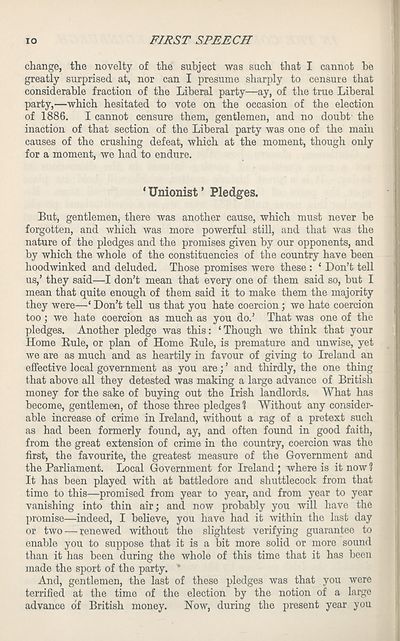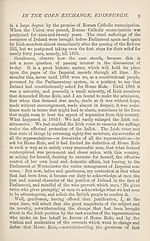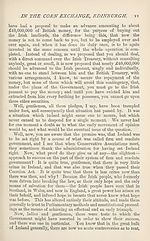Download files
Complete book:
Individual page:
Thumbnail gallery: Grid view | List view

IO
FIRST SPEECH
change, the novelty of the subject was such that I cannot he
greatly surprised at, nor can I presume sharply to censure that
considerable fraction of the Liberal party—ay, of the true Liberal
party,—which hesitated to vote on the occasion of the election
of 1886. I cannot censure them, gentlemen, and no doubt the
inaction of that section of the Liberal party was one of the main
causes of the crushing defeat, which at the moment, though only
for a moment, we had to endure.
‘Unionist’ Pledges.
But, gentlemen, there was another cause, which must never he
forgotten, and which was more powerful still, and that was the
nature of the pledges and the promises given by our opponents, and
by which the whole of the constituencies of the country have been
hoodwinked and deluded. Those promises were these : ‘ Don’t tell
us,’ they said—I don’t mean that every one of them said so, hut I
mean that quite enough of them said it to make them the majority
they were—‘ Don’t tell us that you hate coercion; we hate coercion
too; we hate coercion as much as you do.’ That was one of the
pledges. Another pledge was this: ‘ Though we think that your
Home Rule, or plan of Home Rule, is premature and unwise, yet
we are as much and as heartily in favour of giving to Ireland an
effective local government as you are; ’ and thirdly, the one thing
that above all they detested was making a large advance of British
money for the sake of buying out the Irish landlords. What has
become, gentlemen, of those three pledges 1 Without any consider¬
able increase of crime in Ireland, without a rag of a pretext such
as had been formerly found, ay, and often found in good faith,
from the great extension of crime in the country, coercion was the
first, the favourite, the greatest measure of the Government and
the Parliament. Local Government for Ireland ; where is it now ?
It has been played with at battledore and shuttlecock from that
time to this—promised from year to year, and from year to year
vanishing into thin air; and now probably you will have the
promise—indeed, I believe, you have had it within the last day
or two — renewed without the slightest verifying guarantee to
enable you to suppose that it is a hit more solid or more sound
than it has been during the whole of this time that it has been
made the sport of the party. ‘
And, gentlemen, the last of these pledges was that you were
terrified at the time of the election by the notion of a large
advance of British money. How, during the present year you
FIRST SPEECH
change, the novelty of the subject was such that I cannot he
greatly surprised at, nor can I presume sharply to censure that
considerable fraction of the Liberal party—ay, of the true Liberal
party,—which hesitated to vote on the occasion of the election
of 1886. I cannot censure them, gentlemen, and no doubt the
inaction of that section of the Liberal party was one of the main
causes of the crushing defeat, which at the moment, though only
for a moment, we had to endure.
‘Unionist’ Pledges.
But, gentlemen, there was another cause, which must never he
forgotten, and which was more powerful still, and that was the
nature of the pledges and the promises given by our opponents, and
by which the whole of the constituencies of the country have been
hoodwinked and deluded. Those promises were these : ‘ Don’t tell
us,’ they said—I don’t mean that every one of them said so, hut I
mean that quite enough of them said it to make them the majority
they were—‘ Don’t tell us that you hate coercion; we hate coercion
too; we hate coercion as much as you do.’ That was one of the
pledges. Another pledge was this: ‘ Though we think that your
Home Rule, or plan of Home Rule, is premature and unwise, yet
we are as much and as heartily in favour of giving to Ireland an
effective local government as you are; ’ and thirdly, the one thing
that above all they detested was making a large advance of British
money for the sake of buying out the Irish landlords. What has
become, gentlemen, of those three pledges 1 Without any consider¬
able increase of crime in Ireland, without a rag of a pretext such
as had been formerly found, ay, and often found in good faith,
from the great extension of crime in the country, coercion was the
first, the favourite, the greatest measure of the Government and
the Parliament. Local Government for Ireland ; where is it now ?
It has been played with at battledore and shuttlecock from that
time to this—promised from year to year, and from year to year
vanishing into thin air; and now probably you will have the
promise—indeed, I believe, you have had it within the last day
or two — renewed without the slightest verifying guarantee to
enable you to suppose that it is a hit more solid or more sound
than it has been during the whole of this time that it has been
made the sport of the party. ‘
And, gentlemen, the last of these pledges was that you were
terrified at the time of the election by the notion of a large
advance of British money. How, during the present year you
Set display mode to:
![]() Universal Viewer |
Universal Viewer | ![]() Mirador |
Large image | Transcription
Mirador |
Large image | Transcription
| Antiquarian books of Scotland > Politics & government > Political speeches in Scotland in 1890 > (14) |
|---|
| Permanent URL | https://digital.nls.uk/126568458 |
|---|
| Description | Thousands of printed books from the Antiquarian Books of Scotland collection which dates from 1641 to the 1980s. The collection consists of 14,800 books which were published in Scotland or have a Scottish connection, e.g. through the author, printer or owner. Subjects covered include sport, education, diseases, adventure, occupations, Jacobites, politics and religion. Among the 29 languages represented are English, Gaelic, Italian, French, Russian and Swedish. |
|---|

